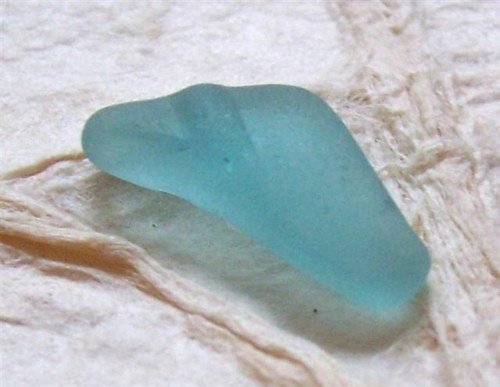I understood, in theory, what I was looking at, I suppose. I mean, I've studied the oceans in geography class, done reports on sea life in elementary school, learned about tides and lunar pull and shipwrecks. Upon seeing it, however, I could not grasp its enormity. Even just standing on the edge of that gulf, looking to the horizon, knowing full well the distance to another shore, I could not imagine such a vastness. I felt small and lonesome and shaken.
Lying on the beach was a small piece of glass. I picked it up as I looked for a shell, a rock, a memory. It was plain and brown, probably just a piece of a broken beer bottle. Nothing special. A remnant from another person's history. Time and tides had dulled its edges some, but it sliced my thumb as I wiped away the sand. Not dulled enough to be safe to handle, I dropped it, and stuck my hand to my mouth on instinct. I left that beach with the taste of pain, coppery and salty, on my tongue.
I love the water. I always have. To swim, to splash, to float. My mother has always been terrified of it; always forcing me into life jackets, looking away as I plunged in. It was one of the few things I was unafraid of. I felt confident and weightless in the water. I could tread longer than anyone else in my swim class. I floated instantly, releasing all my worry into the sky and sun above me. But I had grown up on lakes and pools and creeks. Always, I could see the edge. Always, I knew there was an end. It was only as I stood in the waves, holding the tiny hand of a child, staring out into the ocean, did I first feel the unease. The sense of danger from a riptide and the unknown. It felt too big, too much, too powerful. I calmed myself by digging my toes into the sand underneath. Relief comes from connection, from standing on solid ground.
But there is a certain irresistible beauty in panic, and I waded deeper still.
For the past decade, there have been what I call the "small deaths" -- the "first times". When he stumbled. When he stopped driving. When he moved to a wheelchair. When he could no longer talk on the phone. The delusions. The hallucinations. The anger. When he could not brush his own teeth or shuffle cards or finish a game of dominos. When he could not recognize me. When I could not recognize him. Each moment a wave. Some were ripples, barely noticeable. Others, a tsunami. With each, I panicked more. With each, I kept wading deeper, marking each buoy as I passed, knowing, logically, there was an end I could not see just over the horizon.
I fooled myself into thinking that my father's death would bring me back to dry land. It has not. My grief feels like the ocean, big and powerful and unfathomable. I cannot see the shore although, logically, I know it is there, somewhere. I am adrift right now, alternating between treading and floating, between surviving and living. I am aware of what I can do and what I cannot. I watch the sky for search planes each day. I look for lighthouses. I am afraid of crashing upon the rocks, of hitting an iceberg, of wrecking my ship. I find myself without a compass, using the stars on clear nights to guide me.
I think often of my mother and her fear. How she lingered on the shore or in the safety of the boat. How I might be struggling against the tides now but how I've never been afraid to plunge in and feel the saltwater upon my face.
It is a gift to feel.
It is a gift to feel.
The shoreline is faint and hard to see. But I know it is there. No ocean goes on forever. Their waves meet and mingle, trading pieces of debris -- love notes from a distant land, pieces of a broken dish from a sunken ship, or even just a plain brown beer bottle. I have not forgotten the feel of the sand between my toes. I will recognize the solid ground of the ocean's floor one day, and I will dig in and hold on and haul myself back up on the beach. I will comb its edges for seashells and rocks, digging out memories, and smile.
And perhaps I'll find a piece of sea glass, once broken and plain, now beautiful and weathered, its jagged, sharp edges smoothed fine by the pounding waves.

No comments:
Post a Comment